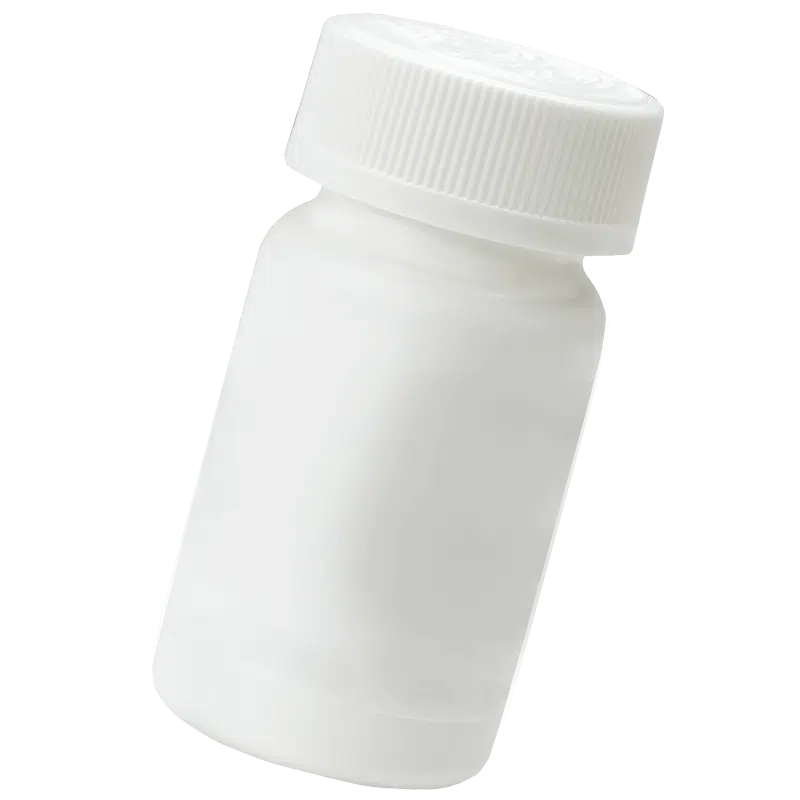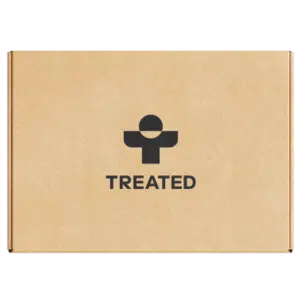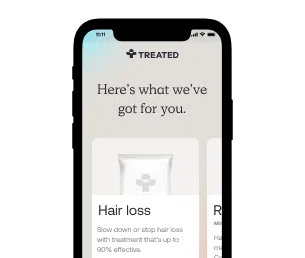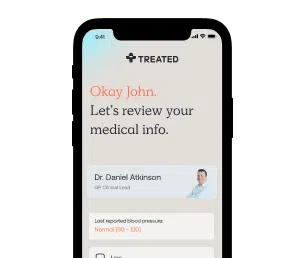On-demand tablet for gout symptoms.


Colchicine is an effective treatment that is used to treat recurrent attacks of gout, and can also help prevent flare ups if you’re newly diagnosed with gout.
Talk to us about your health. Order Colchicine online with us and get specialised aftercare from our clinical team.
It’s a treatment for gout that can be used to help manage flare ups of the condition when they strike. It can be taken for long term relief too, usually at the beginning of treatment with other gout management drugs like allopurinol.
Gout is a painful inflammatory condition that attacks the joints of the toes, but it can also affect the hands and wrists, too . It’s caused by a buildup of uric acid in the blood, which forms crystals in your joints that triggers the pain and swelling in gout attacks.
Taking Colchicine to help manage the condition can be very effective in reducing the pain and discomfort associated with gout. If you think you’ve got gout symptoms then it’s worth having a quick chat with your clinician who’ll be able to help and advise you on diagnosis and treatment.
Colchicine works to reduce the amount of inflammation that occurs in the joints caused by the buildup of uric acid, when you have an attack of gout. It does this by stopping your body from overproducing a type of white blood cell called a neutrophil. Neutrophils help cause the swelling, inflammation and joint problems seen in gout. So, Colchicine can reduce the pain and swelling you feel during attacks, as well as helping to bring them down.
Your Colchicine dosage will depend on your symptoms and whether you’re treating a gout attack or preventing them. Your clinician will make sure the dose is right for you, but if you have any questions, go back to them. You can also send us a message if you’re using our service.
The usual dosage for gout attacks is two 500mcg tablets, followed by another 500mcg tablet after an hour. You can then take one tablet three times a day until your symptoms have eased, but you shouldn’t take more than twelve tablets in total for each episode of gout.
If you’re using Colchicine to prevent gout flare ups whilst you start another gout treatment like allopurinol, you’ll usually take one tablet twice a day. Only take it for as long as your clinician advises you to.

How we source info.
When we present you with stats, data, opinion or a consensus, we’ll tell you where this came from. And we’ll only present data as clinically reliable if it’s come from a reputable source, such as a state or government-funded health body, a peer-reviewed medical journal, or a recognised analytics or data body. Read more in our editorial policy.

How we source info.
When we present you with stats, data, opinion or a consensus, we’ll tell you where this came from. And we’ll only present data as clinically reliable if it’s come from a reputable source, such as a state or government-funded health body, a peer-reviewed medical journal, or a recognised analytics or data body. Read more in our editorial policy.
Have something specific you want to know? Search our info below, or ask our experts a question if you can’t find what you’re looking for.
Excellent service, and very prompt
Excellent service, and very prompt delivery of medicine.
Tablets worked quickly and the
Tablets worked quickly and the pain and swelling went fast
Excellent
Easy system and quick delivery

Registered with GMC (No. 4624794)
Meet Daniel
Registered with GPhC (No. 2202465)
Meet Sanjeda
Registered with GPhC (No. 2070724)
Meet CraigDelivery, consultation, treatment. It’s all included in the price.
| Quantity | Starting from |
|---|---|
| 12 Tablets | £36.95 |
| Quantity | Starting from |
|---|---|
| 28 Tablets | £67.95 |
| 56 Tablets | £119.95 Save £15.95 |
| 84 Tablets | £171.95 Save £31.90 |
| Quantity | Starting from |
|---|---|
| 28 Tablets | £22.95 |
| 56 Tablets | £34.95 Save £10.95 |
| 84 Tablets | £45.95 Save £22.90 |
| Quantity | Starting from |
|---|---|
| 28 Tablets | £25.95 |
| 56 Tablets | £36.95 Save £14.95 |
| 84 Tablets | £48.95 Save £28.90 |
| 168 Tablets | £82.95 Save £72.75 |
| Quantity | Starting from |
|---|---|
| 28 Tablets | £34.95 |
| 56 Tablets | £46.95 Save £22.95 |
| Quantity | Starting from |
|---|---|
| 28 Tablets | £34.95 |
| Quantity | Starting from |
|---|---|
| 28 Tablets | £37.95 |
| 56 Tablets | £59.95 Save £15.95 |
| 84 Tablets | £83.95 Save £29.90 |
| 168 Tablets | £152.95 Save £74.75 |
We know health, but you know you.
Our experts tell you what’s safe, but you decide what’s best.
Answer a few questions and tell us about yourself. Get tailored advice from our clinicians so you can choose better.

Choose your treatment and how often you have it delivered.

We know things change. It’s the nature of life. We’ll check in regularly to make sure your treatment is still right for you.
Pause. Change. Skip. Start again. Any time you like.
Always arrives on time and I’m kept informed of progress.
I have had it previously from my G.P so It worked as expected, extremely well. My problem is an accessing my G.P practice, they put ED well down their list of priorities. I found your service excellent, quick and efficient. I fully intend to continue using it
Shipping is speedy and the product is amazing.
Fast, slick service. Very easy to amend subscription when required.
All good.
Great service
Really helped me
Trusted service and great service - next day delivery and I can rely on them to send regularly.
Ordering was straight forward, tablets delivered promptly and well packaged, and instructions were clear, thanks.
100% recomended.Great service
Excellent service
Excellent delivery. Can’t fault.
Quick and efficient service, delivered discreetly the next day. Thank you.
Effective
Great service, no wait time
Great
Quick assessing for medicine suitability. Quick delivery and good communication throughout.
Straightforward and quick service!
Good however communication could sometimes be better
Easy and good procedure to get treatment
Excellent product
Excellent service!!! Ordered what I needed sent a picture of my prescription and the parcel arrived the next day!!! Will definitely order again and have recommended to others!!!
Fast shipping
Very quick service all round
So quick and simple. Recommend
Great
Very convenient hassle free service.
Easy to use good communication and fast shipping
Great service
Efficient no issues re delivery
Fabulous service
Brilliant service. Not a bad word to say!
It was fast, professional and it's the right med for what I selected in there.
This review requires content. Oh well..
Great service, quite effortless.
Top notch
Brill service
N/a
Excellent service quick and easy to use
Fast and exact order
Superb service and quick delivery 10/10
Excellent service
Thank you for fast delivery
Shipping is extremely quick and satisfiying
Good stuff
Good service
Great fast delivery
Gout: Here are some other options.
Contains febuxostat, which stops gout from flaring up and reduces uric acid in the body.
Like Zyloric, but the generic. Daily tablet that treats both gout and kidney stones.
Anti-inflammatory tablet that tackles the inflammation and pain caused by gout.
Branded, daily tablet that prevents gout symptoms. Available in two doses.
We're making healthcare more about you. Sign up to our newsletter for personalised health articles that make a difference.
Disclaimer: The information provided on this page is not a substitute for professional medical advice, diagnosis, or treatment. If you have any questions or concerns about your health, please talk to a doctor.
We couldn't find what you're looking for.
Here's everything we treat. Or, if you're looking for something we don't have yet, you can suggest something.
If there’s a particular treatment or condition you’re looking for, tell us and we’ll look into it for you.
Submit your question here, or tell us if you’ve found an issue on our site.
We’ll get back to you very soon. We aim to respond to all queries in one working day.
You’re signed up to our newsletter. Keep an eye on your inbox for our latest update.
By clicking 'Subscribe now' you're agreeing to our Privacy Policy.
We’ve sent you an email asking you to confirm your email address.